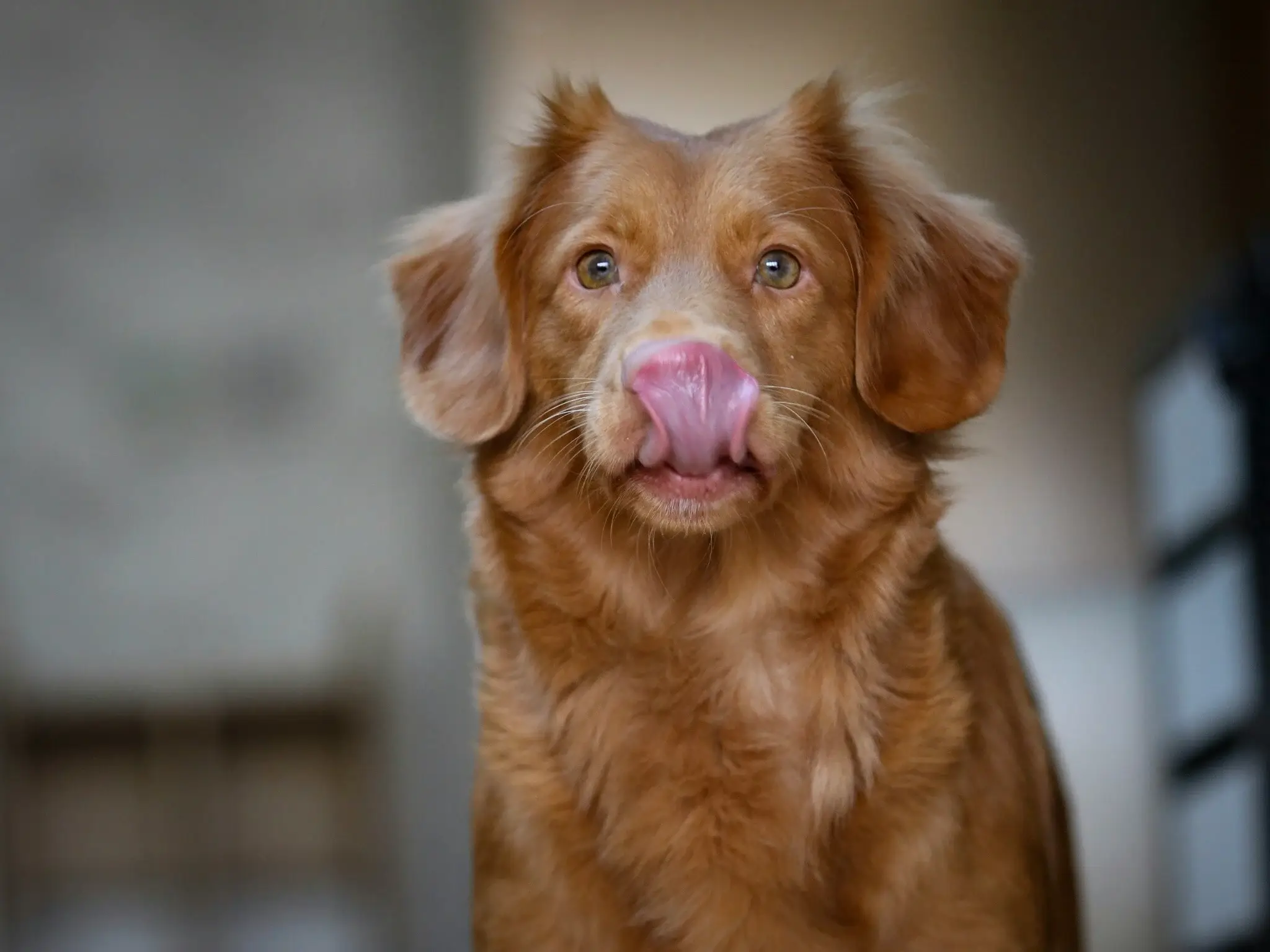
DogFoodAdvisor is reader supported See how
Dog Food Advisor is 100% impartial and is never paid to promote any brand. But if you buy using links on this page, we may earn a referral fee.
Peanut butter is a delicious, healthy snack enjoyed by millions of people across the world. It’s nutritious, packed full of vitamins and healthy fats, and contains plenty of carbohydrates to keep you fuller for longer.
And, of course, slather it on a slice of bread with a layer of jelly on top and many would argue you have one of the finest sandwich fillings known to man — and dog — kind.
But have you ever wondered, whenever your furry companion’s ears prick up and their nose twitches in the air as you twist open the jar of PB, whether they could enjoy a dollop or two alongside you? Is peanut butter good for your dog or is it something that dogs should avoid at all costs?
In this article, we look at the pros and cons of feeding your dog peanut butter, and what to do if you’re worried your dog might have a peanut allergy.
Can your dog eat peanuts?
The first thing to note is that peanuts are legumes rather than nuts, placing them in an unusual gray area when it comes to dogs — can dogs eat legumes, and what about peanuts specifically?
First, you’ll be glad to hear that not only can dogs eat legumes but they are also a healthy and nutritious food for your furry companion. This includes peanuts, but the key point to highlight is to only give them legumes in small amounts, as too much can be unhealthy.
In terms of peanuts, you can happily feed them plain, raw, roasted, or shelled (minus the shell). Ensure you always check for any coatings or flavorings, such as salted, caramelized, or honey-roasted, as you should avoid feeding these additional ingredients to your dog.
What kind of peanut butter can dogs eat?
If your dog enjoys peanuts in moderation, the next logical step is feeding them the very same peanut butter us pet parents spread on bread.
But wait a second before you start spooning the sticky treat into your salivating dog’s food bowl. Check the label first: if there are no added ingredients, it’s good to feed to your furry pal.
But if you see any additional ingredients aside from peanuts, you should pause before offering it to your dog.
The main ingredient that sets alarm bells ringing is xylitol. This synthetic sugar, sometimes called birch sugar, is found in some ‘sugar-free’ peanut butter, and it can be toxic to dogs, so ensure you don’t feed any peanut butter containing xylitol to your dog. This is because it can lead to hypoglycemia (low blood sugar), liver failure, seizures, and, in some cases, death.
Can dogs eat crunchy peanut butter?
Whether it’s creamy or crunchy, smooth or chunky, all types of peanut butter are fine for dogs to eat, as long as they don’t have any added ingredients.
As mentioned above, check the ingredients list before you feed it to your dog, noting in particular what ingredients are added: if it features added sugar, salt or sweeteners (especially xylitol), you should avoid feeding it to your dog, whether it’s crunchy or creamy.
Can dogs eat Jif peanut butter?
Lots of people ask whether dogs can eat Jif peanut butter or Skippy peanut butter, for example. You should be aware of additional sugar and/or salt content, and avoid giving it to your dog if the peanut butter contains either or both.
Jif and Skippy peanut butter both contain additional sugar content which, over time, can lead to obesity, diabetes, breathing issues, and joint problems.
The golden rule is to keep it simple: look for peanut butter that contains only peanuts. There are plenty of brands now that forgo all other ingredients to blend a simple, healthy snack.
What is dog peanut butter?
The best course of action if your dog is a peanut-loving canine is to seek out peanut butter made specifically for dogs. A range of brands now produce dog-friendly peanut butter with no added ingredients that could potentially cause harm.
Dog-specific peanut butter is made with peanuts and nothing else; no added ingredients such as preservatives, sugars, hydrogenated oils, or artificial additives.
Some manufacturers of dog peanut butter add healthy extra ingredients that benefit dogs as well as adding taste, such as seeds, turmeric, or ginger.
Is peanut butter good for dogs?
Peanut butter provides plenty of benefits to dogs. It contains healthy proteins, which is great for your furry friend, as it supports their immune system and aids in making hormones, enzymes, and antibodies.
It also contains fiber, which is crucial for helping maintain a healthy digestive tract, vitamin E for healthy skin, muscles, and eyes, B vitamins including folic acid, biotin, and niacin, as well as plenty of healthy fats.
If your dog paws you every time you make a peanut butter sandwich, you can treat your furry pal by smearing it on lick mats or slathering it in a Kong chew toy to add a little flavorsome stimulus.
The key point to remember is to avoid peanut butter aimed at humans and seek out pup-based peanut butter or, failing that, whizz up your own peanut butter for your dog — that way, you’ll ensure that no unnecessary nasty extras are added to the mix.
How much peanut butter should you give your dog?
As with any food, when treating your dog to peanut butter, be aware of the importance of portion control. Peanut butter should only be offered as a snack rather than a meal, not least because it contains high levels of protein and fats, so can lead to obesity if you give your dog too much, especially if your dog gains weight easily.
It’s sensible to treat peanut butter as a healthy snack and, as with all snacks, follow the 10% rule, where snacks should not take up more than 10% of your dog’s diet.
What happens if you give your dog too much peanut butter?
As previously mentioned, one of the main issues with overindulging your dog with peanut butter is that it can lead to weight gain, so ensure you keep portions small and use it just as a treat or reward when training.
Some people worry about the potential presence of aflatoxins in peanuts, but the standards for growing and processing peanuts in the US are high to ensure that contaminated products do not enter food production 1.
Can dogs suffer from peanut allergies?
Food allergies in dogs are less common in dogs than you might think. However, although rare, dogs can occasionally suffer an adverse reaction to peanuts.
If your dog eats peanuts or peanut butter, watch for signs of sensitivity, such as itching and scratching, an upset stomach, or sickness. If your dog displays any of these symptoms after consuming peanut butter, contact your vet for further advice.
Final word
The Dog Food Advisor does not accept money, gifts, samples or other incentives in exchange for special consideration in preparing our reviews.
However, we do receive a referral fee from online retailers (like Chewy or Amazon) and from sellers of perishable pet food when readers click over to their websites from ours. This helps cover the cost of operation of our free blog. Thanks for your support.
For more information, please visit our Disclaimer and Disclosure page.
Article reviewed by
Laura Ward
Pet Nutritionist
Laura studied BSc (Hons) Animal Science with an accreditation in Nutrition at the University of Nottingham, before working for eight years in the pet food and nutrition industry.




